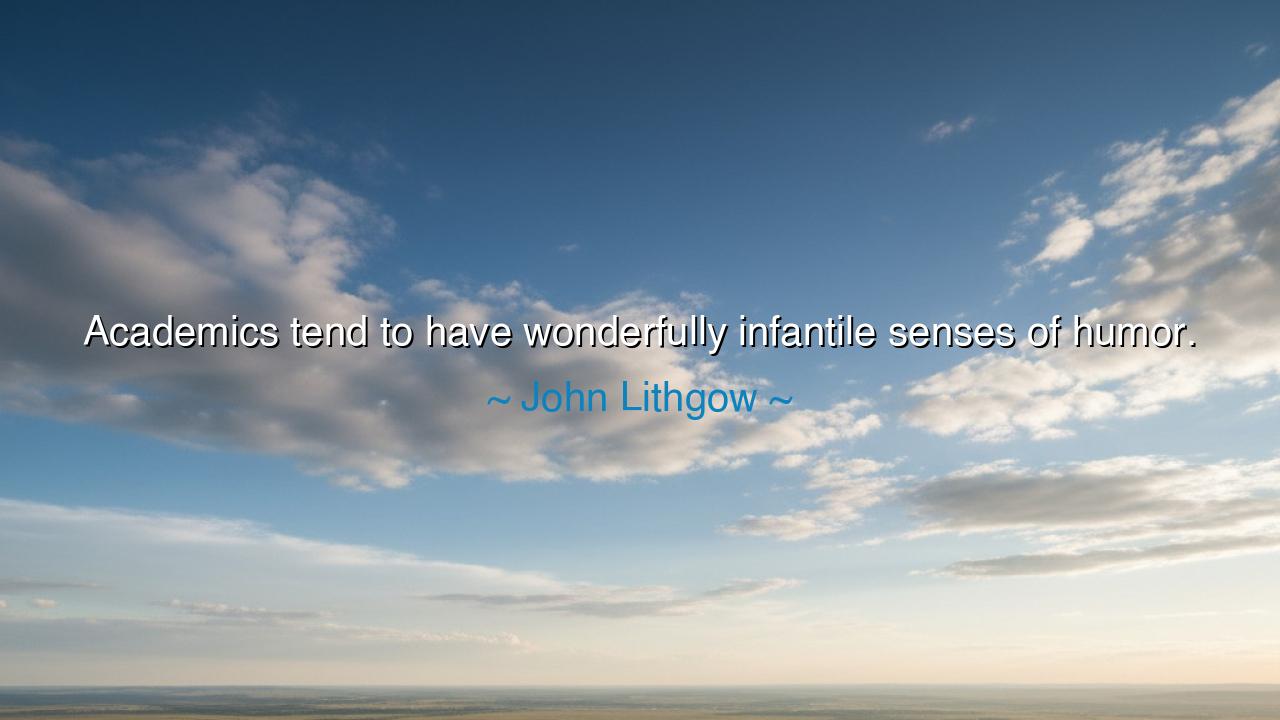
Academics tend to have wonderfully infantile senses of humor.






When John Lithgow said, “Academics tend to have wonderfully infantile senses of humor,” he was not mocking the wise but celebrating them. Beneath his words lies a paradox of the spirit — that those who dedicate their lives to knowledge, who dwell in the realm of ideas and abstraction, often carry within them the pure, childlike joy that is the wellspring of creativity. Lithgow reminds us that intellect and play are not enemies; they are twin forces that, when united, create brilliance. For the greatest minds have always known that to think deeply, one must also laugh freely.
In the manner of the ancients, we may say that wisdom and laughter spring from the same fountain. The philosopher Socrates was known not only for his piercing insight but for his mischievous wit. His dialogues, though profound, are filled with irony and humor — for he knew that truth cannot dwell long in hearts that are closed by solemnity. To have an infantile sense of humor is not to be foolish, but to be unburdened by pretense. It is to look upon the world with wonder once more, to see absurdity and beauty interwoven, and to delight in both. The child laughs not because he knows little, but because he sees purely. The academic, in returning to that childlike laughter, rediscovers the essence of learning — curiosity without fear.
Lithgow’s observation carries within it a subtle reverence. Those who have walked the corridors of scholarship, surrounded by theories and tomes, know that knowledge alone can grow cold. It must be warmed by humor, by the ability to laugh at oneself and at the cosmic comedy of human striving. The “infantile humor” he speaks of is not immaturity, but the innocence that remains after wisdom — the capacity to find joy in simplicity after having wrestled with complexity. In that laughter lives balance, for too much solemnity suffocates the spirit, and too much pride blinds the eyes of the wise.
Consider the story of Albert Einstein, whose laughter was as famous as his genius. Though he unveiled the mysteries of space and time, he often joked about his disheveled hair, his forgetfulness, and the absurdity of human ambition. Once, when asked about his theory of relativity, he quipped, “When you sit with a nice girl for two hours, it seems like two minutes. That’s relativity.” In that playful wit lived the secret of his greatness: the child within the scholar had never died. His humor kept his wisdom human. Like Lithgow’s academics, Einstein knew that joy sustains the intellect as breath sustains life.
Humor, then, becomes a sacred bridge between the scholar and the soul. It protects learning from arrogance and reason from despair. In laughter, even the proudest thinker remembers his own humanity. The ancient sages often taught through fables, irony, and playful riddles — for they understood that truth, when wrapped in mirth, is more easily received. To laugh while thinking deeply is to keep the heart young even as the mind grows old. It is to remember that knowledge without joy is but a cage made of light.
Lithgow’s insight also carries a hidden warning: when learning loses laughter, it becomes dogma. The academic who forgets to play becomes brittle; his knowledge becomes heavy and lifeless. But the one who retains the childlike humor that Lithgow praises can face even failure with grace. Such laughter humbles the proud, uplifts the weary, and invites others to think without fear. For in humor there is freedom — the freedom to question, to err, and to imagine beyond the walls of certainty.
The lesson, then, is timeless: no matter how much you learn, never lose your laughter. Seek wisdom, but carry wonder. Question the world, but do not forget to smile at its strangeness. The “infantile humor” that Lithgow honors is not the opposite of intellect — it is its companion, its breath of life. To be truly wise is to know when to laugh, and to find joy even in the pursuit of truth. For laughter, as the ancients would say, is the music of a soul that has understood the vastness of the universe — and chosen, still, to dance within it.






AAdministratorAdministrator
Welcome, honored guests. Please leave a comment, we will respond soon